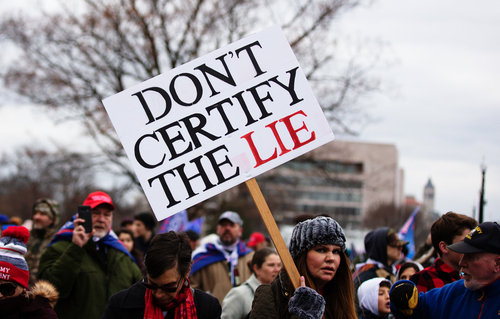
In a recent development that has sent ripples through the ongoing legal battles stemming from the January 6th Capitol incident, DC Police Officer Byron Evans has made a startling admission. Despite being part of a lawsuit against several Trump supporters, including Brandon Straka, under the KKK Act for alleged racist attacks, Officer Evans has now disclosed that he was not physically present at the scene as previously believed. Instead, he was watching the events unfold on television.
Officer Evans, along with seven other black Capitol Police Officers, had initiated legal action claiming they were victims of racism and assault during the January 6th protests. The lawsuit targeted various individuals, accusing them of violating their civil rights. However, the credibility of these claims has come into question with the revelation that Officer Evans was in a secure location at the time, behind locked doors in the Visitor Center.
(Thread) This is Capitol Police Officer Byron Evans.
Officer Evans sued me under the KKK Act alleging that I violated his civil rights and that I conspired with white supremacists to commit assault and battery against him on January 6th. (follow this thread to see how Officer… pic.twitter.com/fLGCgULvHi
— Brandon Straka (@BrandonStraka) December 27, 2023
The lawsuit, which has been financially backed by a law firm with connections to prominent philanthropist George Soros, sought damages for the alleged injuries sustained by Officer Evans. Yet, the officer’s own testimony during discovery has raised doubts about the legitimacy of these claims. It appears that the valuation of his injuries was pursued without clear evidence of his direct involvement in the physical altercation.
Brandon Straka, one of the defendants in the case, has publicly refuted the accusations, stating that he never met or encountered any of the officers involved in the lawsuit. Furthermore, he asserts that he did not engage in any actions such as spraying chemical pollutants during the protests, challenging the narrative that has been constructed around the events of that day.
DC Police Officer Byron Evans Who Sued Republicans Under KKK Act for Racist Attacks on Jan. 6 – Now Admits He Was Watching it on TV that Day (Video) @BrandonStraka https://t.co/VTIZlE9D8Z #gatewaypundit via @gatewaypundit
— The Gateway Pundit (@gatewaypundit) December 27, 2023
The implications of Officer Evans’ admission are significant, casting a shadow over the lawsuit and potentially undermining its foundation. It also raises questions about the motivations behind the legal action and whether it was initiated on solid factual grounds or if it was influenced by political agendas.
This case has become emblematic of the broader tensions and divisions that have marked the aftermath of January 6th. It underscores the complexities of discerning truth in an era where political narratives often overshadow objective facts. As the legal proceedings continue, the focus will likely shift to the veracity of the claims made by the plaintiffs and the integrity of the lawsuit itself.
The defendants, for their part, are likely to seize upon this new information as they seek to defend themselves against what they view as unfounded accusations. The unfolding drama of the courtroom will no doubt continue to capture public attention, as it reflects the ongoing struggle to reconcile the events of that tumultuous day with the principles of justice and due process.
In conclusion, the revelation that Officer Byron Evans was observing the January 6th protests from a television screen rather than experiencing them firsthand has introduced a new dimension to the legal battles that have ensued. It serves as a reminder of the importance of thorough investigation and fact-checking in the pursuit of justice, especially in cases that hold such significant political and social weight.









